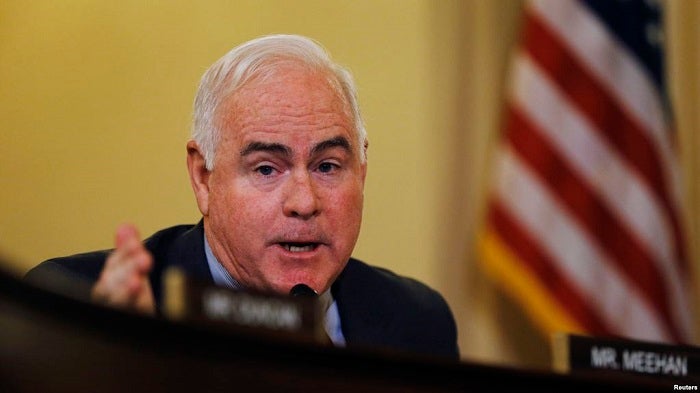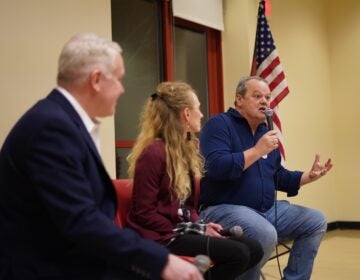Meehan won’t seek re-election after furor over payment to aide claiming harassment
The Delaware County Republican is the fifth member of Congress to resign or abandon re-election amid a national reckoning over sexual misconduct in the workplace.

U.S. Rep. Pat Meehan will not seek a fifth term in Congress. (AP file photo)
Delaware County U.S. Rep. Pat Meehan has decided not to seek re-election this year as he wrestles with a sexual harassment scandal. In a letter to his campaign chairman, Meehan said he’d added fuel to the furor telling reporters he’d regarded his accuser as a “soul mate.”
The controversy began Saturday when the New York Times reported that a young woman on Meehan’s Congressional staff had filed a complaint charging the Meehan had expressed romantic interest in her and had become hostile when she didn’t reciprocate.
Meehan, 62, is a four-term congressman and former U.S. attorney in Philadelphia. In an extraordinary series of interviews with reporters Tuesday, Meehan sought to explain his conduct, saying he had “deep affection” for the aide and had expressed that to her at her invitation.
In his letter announcing he would not seek another term, Meehan said it was “harmful” to describe his aide as a “soul mate.”
“I truly didn’t even consider or understand the full implications of the use of that term,” Meehan wrote. “In no way did I intend that the use of that term would suggest a romantic partnership.”
Meehan said he’d remained faithful to his wife, and had no interest in a romantic relationship with his “co-worker.” Meehan also said he’s talking with friends and professionals about “power dynamics in an office setting,” and that “I must acknowledge that it is not how I feel about a conversation but to appreciate how that conversation can put another person in an uncomfortable place.”
Meehan added that he believes “there are legitimate questions of proportionality in the emerging dialogue over workplace harassment,” and that he acted “at all times, within the appropriate boundaries of the close relationship I shared with the former employee.”
Meehan was removed from the House Ethics Committee when the settlement became public. The committee now is conducting an investigation, and Meehan said that if the committee finds he engaged in sexual harassment he’ll reimburse the amount paid from taxpayer funds to his accuser, a payment he refers to as a severance to a departing employee.
Wanted: new candidate
Meehan’s rapid fall leaves Republican leaders with the task of finding a new candidate for the 7th Congressional District, which includes parts of Delaware, Montgomery, Chester, Berks, and Lancaster counties.
State Republican Chairman Val DiGiorgio said in a phone interview that Meehan’s departure caught everyone by surprise. “We’ll have to get together and see who’s interested in running and pick the best candidate possible,” he said.
Delaware County GOP Chairman Andrew Reilly said there are plenty of potential candidates interested, none of whom he was prepared to identify.
He said the scramble for a new horse has an upside. “We’re pleased to have Pat who served for several years,” Reilly said, “but now it’s good to sort of regenerate the interest and get some new blood, get some younger people involved, and I’m looking forward to the process.”
The search is complicated by the fact that the district boundaries could be re-drawn due to a court order that found the existing lines were engineered to benefit Republicans.
Democrat Hillary Clinton narrowly won the district in the 2016 presidential election, and winning it likely becomes an even bigger target for Democrats hoping to ride an anti-Trump wave in Philadelphia’s suburbs.
The deadline for entering the party primary is March 6th.
Here’s the full text of the letter Meehan wrote to his campaign chairman, Michael Puppio:
Dear Michael,
After consultation with my wife Carolyn and with my three sons, and after prayerful reflection, I write to inform you that I will not seek re-election to the United States Congress for the 7th Congressional District in 2018. Today I communicated the same to the office of Speaker Paul Ryan.
During my service, I have learned that representation of our district’s people in Congress requires a fierce focus on problems we face and a strong voice to be fighting for solutions. I will continue to do that, whether it is protecting worker’s jobs at local refineries, fighting to get health screenings for constituents exposed to polluted groundwater, or assuring that local farmers have the workers they need to compete globally. I intend to keep fighting for my constituents until the end of my term.
Elections have consequences and it is likely more true today than ever before. That is why elections must allow for a vigorous debate over the policies and proposed solutions that address the great challenges we face as individuals, as a region, and as Americans in a complex and frequently dangerous world. There is much at stake. Moreover, the representation of a region like ours requires judgment, heartfelt empathy, and political courage. Too much of Congress has retreated into partisan corners with angry rhetoric stifling the call for smart and reasonable compromise. I have sought in each vote I take to assure that I am striking that correct balance. I strive to do what is right for our region. That is why I stood up against my party when I felt its’ proposed law on health care was leaving some struggling sick behind. I stood with my party on tax reform when I thought hard working families from our region would benefit from an economy that produces more family sustaining jobs.
Further, the tax bill is a concrete example of why it is so valuable to be “in- the – room” when delicate negotiations on significant legislation are taking place. That is why having worked my way into a critical seat on the House Ways and Means Committee has been important for our region.
Unfortunately, recent events concerning my office and the settlement of certain harassment allegations have become a major distraction. I need to own it because it is my own conduct that fueled the matter. I have self reported the events and settlement to the House Committee on Ethics for their consideration and I tendered my own resignation from the Committee so that there would not be any question raised about their deliberations. That is why I have also stated that if the Ethics Committee concludes I have engaged in sexual harassment that I am prepared to repay the full amount of the severance that was paid to the employee.
It is clear to me, that under the current conditions, any campaign I would run would not be decided over vital issues but would likely devolve into an ugly spectacle of harsh rhetoric. I do not believe that is in the best interest of the constituents I represent.
The recent narrative surrounding the close workplace relationship I shared with a former employee has spun wildly out of perspective. Moreover, recent attempts I have made to answer the questions of local print, radio and television media about the matter have only complicated that communication.
I am a happily married man to an accomplished and supportive wife to whom I have never been unfaithful and I had no interest in doing so. That is why characterizations of a romantic interest in a co-worker are not only unfair, they are wrong.
I know from the many supportive comments I have received from friends, that I am not alone in a world where a married spouse also has an especially close and interactive daily work relationship with another person of the opposite sex. I also know that, like in a marriage, the shared work experience can create a bond that is strong and that can operate on multiple levels. I know that the accomplishments and stresses of daily interaction in a workplace can forge an emotional connection that has its own identity. I also know that such connections can lead to a caring interest in the life of the other person that extends beyond the purely professional experiences they share. That does not mean that either partner would deem this connection to be a romantic one.
In an effort to be honest and accountable to the constituents I represent, I recently spoke to reporters to give straight answers to very difficult and probing questions. No characterization of the work relationship I shared with a uniquely close colleague could have been more personally harmful than when I described that co-worker as a “soul-mate.” I truly didn’t even consider or understand the full implications of the use of that term. Quite simply to me a soul-mate means a uniquely close person who is joined with you on a daily basis, in which you both share the routine successes and strains of a work day.
In no way did I intend that the use of that term would suggest a romantic partnership. It is human to connect with someone who has the same work perspective and is invested in achieving the same work goals. After spending a lengthy amount of time together it is also natural that the connection will be one of a caring attitude toward each other.
Similarly, I take umbrage in the fact that newspaper reports, citing unnamed witnesses, could have any capacity to characterize any sentiment or emotion that I might have been feeling as jealousy toward another person in my co-worker’s life. There is simply no foundation for that conclusion and reporting it as so is biased.
I felt then, and I still feel despite the current controversy, that I was blessed to work closely for nearly eight years with a person I admired and respect. While we shared a natural rapport, I did not unnaturally inquire about things in her personal life. Hearsay accounts that I furtively asked others about her life away from the office are simply untrue. When I became aware, through office conversation, that the aide was planning to move abroad and marry someone she had only known for a short while, I knew it would mean the termination of the long professional relationship we shared.
I am talking with and listening to friends and professionals about power dynamics in an office setting and I am not trying to evade responsibility when something crosses the line. Most importantly, I must acknowledge that it is not how I feel about a conversation but to appreciate how that conversation can put another person in an uncomfortable place. I do believe there are legitimate questions of proportionality in the emerging dialogue over workplace harassment and that I acted, at all times, within the appropriate boundaries of the close relationship I shared with the former employee.
Respectfully,
Patrick L. Meehan,
Member of Congress Pa-07
WHYY is your source for fact-based, in-depth journalism and information. As a nonprofit organization, we rely on financial support from readers like you. Please give today.





